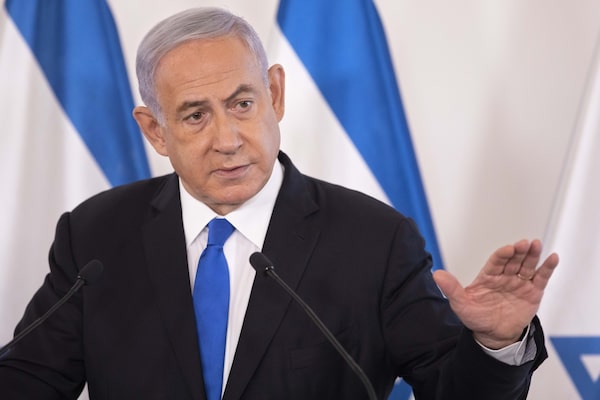
Israeli Prime Minister Benjamin Netanyahu gestures as he speaks during a briefing to ambassadors to Israel at the Hakirya military base in Tel Aviv, Israel, May 19, 2021.Sebastian Scheiner/The Associated Press
Diana Buttu is a Palestinian-Canadian lawyer based in Haifa. She worked as a legal adviser to the Palestinian negotiating team from 2000 to 2007.
The sound of Israelis chanting “Death to Arabs” while Israel flattens entire residential buildings in the Gaza Strip has made my home in Haifa a frightening place. Across the country, my friends are witnessing similar incidents, leaving many pundits to wonder about what broke the “calm,” even after the Thursday announcement of a ceasefire between Israel and Hamas. But this question ignores the years of Israeli government decisions – specifically, by Israeli Prime Minister Benjamin Netanyahu – that led to this moment.
Mr. Netanyahu, Israel’s longest-serving Prime Minister, has been unable to form a stable government, leading to four elections over the past two years. His inability to form government, however, has nothing to do with his policies, and much to do with his personality and the corruption charges he currently faces. Before the latest violence began, there was finally a glimmer of hope that Mr. Netanyahu would not continue as Prime Minister; talks had begun with Opposition party leaders to form a new government. It is in this context – of Mr. Netanyahu’s desire to remain in office – that the latest Israeli attacks are taking place.
Mr. Netanyahu’s inflammatory and self-interested actions predate the Gaza campaign. It began with the decision to limit the number of Palestinian Muslim worshippers from accessing the al-Aqsa mosque during Ramadan, citing COVID-19. As protests against this policy intensified, Mr. Netanyahu further inflamed the situation, allowing Israeli security forces to fire tear gas, stun grenades, rubber bullets and, according to a Red Crescent doctor, live ammunition, both inside the mosque and within its compound. He also allowed Israeli military police to stop Palestinian worshippers from spending the holiest night of the year in the al-Aqsa compound by blocking their access to Jerusalem on a major highway while, just days before, allowing Israeli settlers to riot through the streets, attacking Palestinians.
How long did Israel think Palestinians would put up with their current situation?
Behind the Israeli-Palestinian violence, the ghost of a peace process
Today, Israel’s political parties are speaking of a national unity government headed by Mr. Netanyahu. Politicians who previously opposed him are firmly backing him in his new attacks on Gaza. Many of his current opponents, after all, were part of his political party or once sat in his cabinet – indeed, his rivals have almost uniformly embraced Israeli settlement expansion, as well as Israeli attacks on the Gaza Strip, and these opposition figures have themselves enacted laws that entrench the second-class status of Palestinians in Israel. In short, we have not witnessed the end of his reign.
And so once again, Palestinians are paying the price.
To date, Israel has bombed hospitals, schools, homes, a coronavirus-testing facility, businesses, power plants and water infrastructure in Gaza. Israel has killed more than 230 Palestinians, including 65 children. Mr. Netanyahu’s inflammatory words have incited anti-Palestinian mob attacks in Israel and settler violence in the West Bank. He has stopped at nothing to ensure his control.
But to be clear, this isn’t just about one person. It is about an international system that has allowed this type of behaviour to fester.
For decades, Palestinians have not only lived under brutal Israeli military occupation but have seen the world dismiss or ignore what the International Criminal Court is now investigating as alleged war crimes perpetrated against us, usually in the name of assuaging “Israeli public opinion” or promoting a fictional “peace process.” For example, when I was involved in Israeli-Palestinian negotiations, we consistently raised the alarm over continued Israeli settlement activity, which doubled in a short four-year period as Israel scrambled to take as much Palestinian land as possible. Yet we were met with international indifference, as though Israeli settlements would surely magically be absorbed into the structure of any potential peace agreement.
Palestinians are also routinely told that Israel’s “security concerns” need to be accommodated to assuage Israeli fears, which is used as justification for the lack of international involvement regarding the suffocating siege on the Gaza Strip or the hundreds of checkpoints and roadblocks in the West Bank. We have been told that racist statements made by Israeli leaders are simply “political electioneering.” Most recently, when Mr. Netanyahu’s Likud Party offered positions in government to the Religious Zionist alliance in exchange for support in March, the international community was mostly silent – even though that alliance includes the extremist Jewish Power Party, an offshoot of a political movement that considers Arabs and other non-Jews in Israel to be enemies of the state. The end result of the silence and the statements of support for Israel has been a coddling of Israel and its leaders, allowing them to act with complete impunity.
Sadly, unless a new path is forged – one where Israeli officials are held accountable for their actions – we will once again see Palestinians paying the price for decades of Israeli impunity. Yet if the collective Palestinian response to these assaults over the past month are any indicator, Palestinian resolve to achieve justice and dignity will only redouble.
Keep your Opinions sharp and informed. Get the Opinion newsletter. Sign up today.